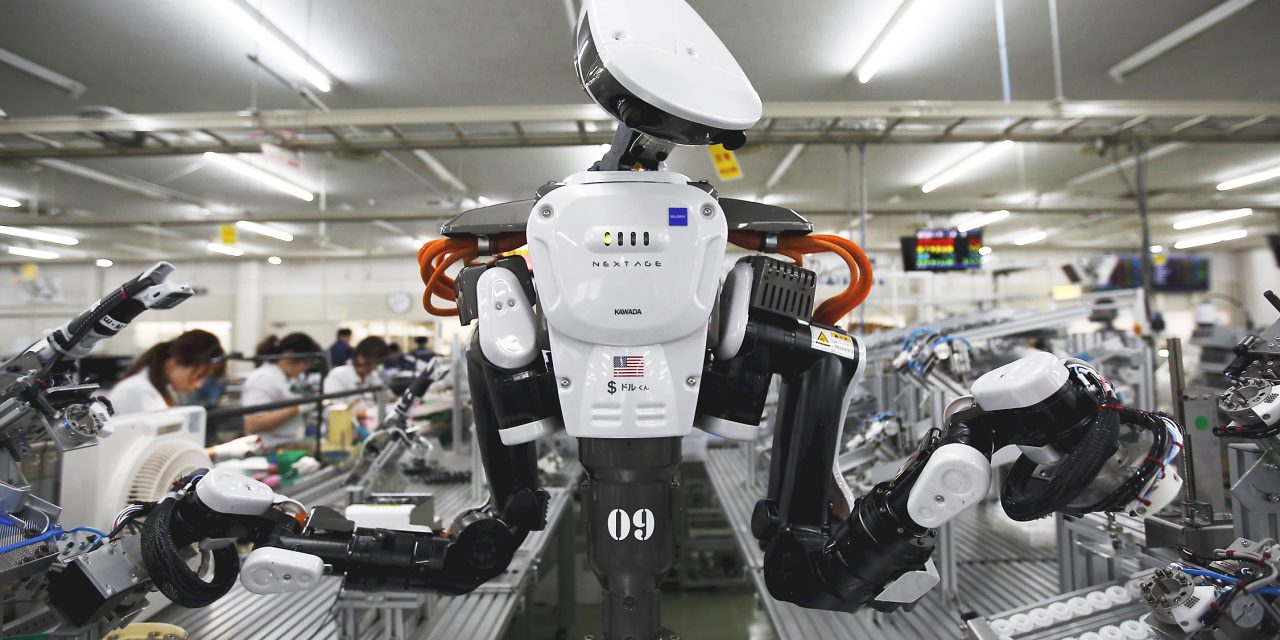While Detroit Mayor Mike Duggan and other civic leaders predict a Motown renaissance in the near future, new research confirms that the inner city and tri-county area are already far ahead of the curve in one key area – industrial robots replacing manufacturing workers.
A new study by the Brookings Institution shows that Metro Detroit has almost five times the number of robots of any other metropolitan area in the nation. What Brookings found is that the concentration of robots vs. workers varies dramatically across the U.S. landscape and that the Big Three domestic auto industry accounts for nearly half of all manufacturing robotics in the U.S.
While blue collar workers naively believe that technology and automation do not present a threat to their jobs, the study found that, while industrial robots are by no means everywhere, they are clustered heavily in a short list of Midwestern and Southern manufacturing states, especially the upper Midwest.
Those include Michigan, Ohio, Indiana, Tennessee and Kentucky. In Michigan, the Grand Rapids area is a surprisingly high-profile location on the list of nationwide robotics.
Major manufacturing centers like Toledo, Grand Rapids, Louisville, and Nashville loom large. Each of these metropolitan areas saw a tripling of the number of robots in operation during the auto boom between 2010 and 2015. Among these metros, the number of robots for every 1,000 workers now ranges from 4.8 in Nashville to 6.3 in Grand Rapids, and 9.0 in Toledo.
Mark Muro, a senior fellow at Brookings, said that the data for their map came from the International Federation for Robotics. The resulting pattern is dense concentration in the industrial upper Midwest, Northeast and Upper South, along with the San Francisco and Los Angeles areas. In contrast, vast parts of the country have no semblance of robotics activity.
Here’s how Brookings described this growing trend:
This clustering follows logically from the fact that the auto industry—highly concentrated in the Midwest and upper South—currently employs nearly half of all industrial robots in use. (Lesser but significant users are the electronics and rubber and plastics industries).
But at any rate, more than half of the nation’s 233,305 industrial robots are burning welds, painting cars, assembling products, handling materials, or packaging things in just 10 Midwestern and Southern states, led by Michigan (which accounts for nearly 28,000 robots, 12 percent of the nation’s total), Ohio (20,400, 8.7 percent), and Indiana (19,400, 8.3 percent), followed closely by Tennessee. By contrast, the entire (American) West accounts for just 13 percent of the nation’s industrial bots.
… There is no doubt that robotics are playing a substantial role in shaping the dynamics of many, though by no means all, local economies.
At the same time, a Gallup poll conducted earlier this month found that an extraordinary number of American workers do not believe their jobs are in jeopardy due to robotics, automation or other technological advances:
Employed Americans Not Worried About Various Employment Setbacks Happening
Please indicate whether you are worried or not worried about each of the following happening to you, personally, in the near future. How about — ?
| Worried | Not worried | |
| % | % | |
| That your benefits will be reduced | 32 | 68 |
| That your wages will be reduced | 19 | 81 |
| That you will be laid off | 19 | 81 |
| That your hours at work will be cut back | 16 | 84 |
| That your job will become obsolete or unnecessary because of technology | 13 | 87 |
| That your company will move jobs to countries overseas | 9 | 90 |
| GALLUP, AUG. 2-6, 2017 | ||
Gallup draws this conclusion:
“Amid the steady stream of news about driverless cars, artificial intelligence and robots supplanting humans in the workplace, most employed U.S. adults are not worried that their jobs will become obsolete or unnecessary because of technology. U.S. adults are most concerned that their benefits will be reduced, though worry about that is not high either.”






